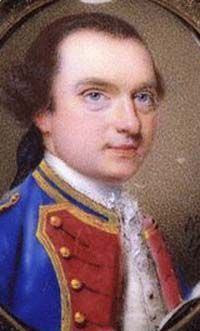There has been an artillery fort
guarding Harwich port for over 400 years. Now giving a close-up view of
Felixstowe container port it also gives us a fascinating window into
history. Among all the features which
intrigued me while visiting the fort, was the name Philip Thicknesse and
his colourful life. A handsome man,
witty in conversation he could also be rude and insulting.
Philip attracted loyalty and
derision. Born a vicar’s son, he became
apprentice to an apothecary, but in 1735, at the age of 16, he decided to
accompany John and Charles Wesley on a journey to America. After two years living as a hermit in a log cabin, he returned home and then
travelled to Jamaica where he was made captain of a militia hunting down
escaped slaves. On returning to England he became captain-lieutenant in a
marine foot regiment, based in Southampton.
Needing money, he sought out a rich wife. His chosen victim was Maria Lanove, who
agreed to elope with him despite her parents’ objections. Her money provided them with an entertaining
life in Bath until Maria and 2 of her children died of diphtheria. Needing to
care for his remaining daughter, Anna, and to support his need for gambling and taking laudanum, Thicknesse spent considerable time
trying to claim Maria’s considerable inheritance
Proving to be a very bad-tempered,
unpleasant man, Philip had few friends, especially among fellow officers but
women found him attractive and his men were loyal to an officer who treated
them fairly. Only a few months after Maria’s death, he married Lady Elizabeth
Tuchet. Lady Elizabeth brought a dowry of £5000 which Thicknesse used to purchase
the lieutenant-governorship of Landguard Fort. He remained at Landguard
Fort from 1753-66 and won the absolute loyalty of his men by opposing the use
of corporal punishment which he regarded as barbaric. However, he had little
respect for his superiors. He enjoyed
quarrelling with local dignitaries and officers. His bête-noir was Colonel Francis
Vernon of the Suffolk militia after Vernon had reprimanded him. Thicknesse
tried to scupper Vernon’s election chances by publishing scandalous
broadsheets. Finally, Vernon took Philip to court for slander and in 1763
Thicknesse was fined £100 and sent to prison for 3 months.
 |
| Ann Ford Thicknesse |
A year prior to this, Elizabeth had died,
but once again Philip had made a swift marriage, this time to Elizabeth’s
companion, Ann Ford, a skilled musician and singer, who spoke 5 languages. Thomas Gainsborough, a good friend of
Thicknesse, painted Ann with her viola da gamba sitting on her lap. Ann and Philip were married for thirty years and had six children.
After leaving prison, Philip’s
behaviour as Lieutenant-Governor of the fort was so unreasonable that he was
judged unfit for command and resigned his post. Returning to Bath in 1766, the
family soon travelled to Europe where Philip wrote several travel books
including, “Observations on the Customs and Manners of the French Nation.” In a guide to Bath he recommended, “drinking
to excess,” and “the frequent inhalation of the breath of young women.”
In 1792 Philip Thicknesse died on one of his
European journeys in a coach near Boulogne and was buried there. As the French
Revolution had recently commenced his wife Ann was imprisoned in a Convent for
several years, narrowly escaping the guillotine








Wow! What an extraordinary character.
ReplyDeleteHis name would suit a politician!
ReplyDelete